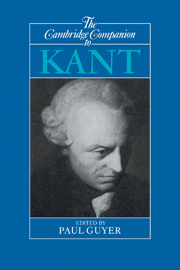Book contents
- Frontmatter
- Introduction
- 1 Kant's intellectual development
- 2 The Transcendental Aesthetic
- 3 Functions of thought and the synthesis of intuitions
- 4 The transcendental deduction of the categories
- 5 Causal laws and the foundations of natural science
- 6 Empirical, rational, and transcendental psychology
- 7 Reason and the practice of science
- 8 The critique of metaphysics
- 9 Vindicating reason
- 10 Autonomy, obligation, and virtue
- 11 Politics, freedom, and order
- 12 Taste, sublimity, and genius
- 13 Rational theology, moral faith, and religion
- 14 The first twenty years of critique
- Bibliography
- Index
11 - Politics, freedom, and order
Kant's political philosophy
Published online by Cambridge University Press: 28 May 2006
- Frontmatter
- Introduction
- 1 Kant's intellectual development
- 2 The Transcendental Aesthetic
- 3 Functions of thought and the synthesis of intuitions
- 4 The transcendental deduction of the categories
- 5 Causal laws and the foundations of natural science
- 6 Empirical, rational, and transcendental psychology
- 7 Reason and the practice of science
- 8 The critique of metaphysics
- 9 Vindicating reason
- 10 Autonomy, obligation, and virtue
- 11 Politics, freedom, and order
- 12 Taste, sublimity, and genius
- 13 Rational theology, moral faith, and religion
- 14 The first twenty years of critique
- Bibliography
- Index
Summary
Kant's practical philosophy in its entirety comprises ethics and philosophy of right, moral theology, moral anthropology, and the philosophy of history, and combines them into one impressive theoretical structure. The theory of the self-legislation of pure practical reason developed in the Groundwork of the Metaphysics of Morals (1785) and Critique of Practical Reason (1788) stands at the center of this system. Through this theory Kant provides an entirely new theoretical foundation for justification in practical philosophy. In the previous history of practical philosophy foundations and first principles were sought in objective ideas, in a normative constitution of the cosmos, in the will of God, in the nature of man, or in prudence in the service of self-interest; but Kant was convinced that these starting-points were without exception inadequate for the foundation of unconditional practical laws, and that human reason could only concede absolute practical necessity and obligatoriness to norms that arose from its own legislation.
- Type
- Chapter
- Information
- The Cambridge Companion to Kant , pp. 342 - 366Publisher: Cambridge University PressPrint publication year: 1992
- 27
- Cited by

